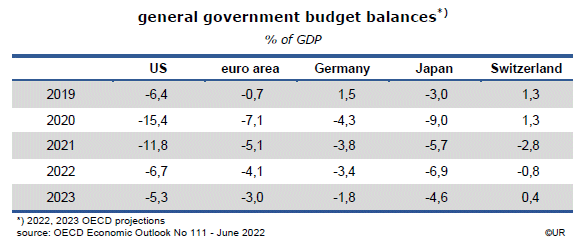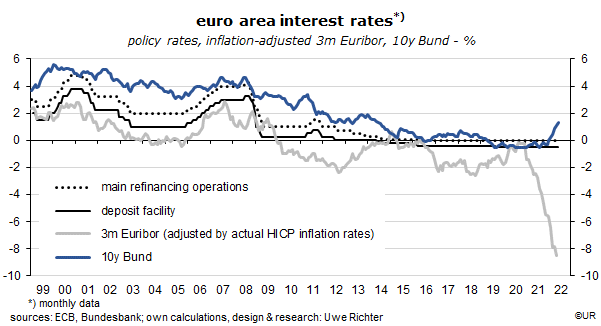Dieter Wermuth, Economist and Partner at Wermuth Asset Management
After 14 years of expansionary policies, central banks have recently changed course. They react to the steep increase of consumer prices. Both in the United States and the euro area inflation rates have suddenly increased to around 8%, and there is no sign that they will fall back to their 2% targets. Just the opposite, import and industrial producer price inflation rates, reliable leading indicators of things to come, are in the order of 20 to 30% year-on-year. Wages which had been subdued in real terms for many years, have begun to recover lost territory. Inflation can no longer be explained by special, transitory factors – it looks broad-based.
Pressure to fight inflation is clearly rising. Savers, poor households which typically spend a large portion of their income on food and energy, as well as car drivers have begun to revolt against the steep increase of price levels. They are supported by the populist media. Politicians have heard the message and have begun to react. The new mix consists of increasingly restrictive monetary policies, subsidies for the consumption of fossil fuels (no matter what this will do to the environment) and a reduction of government budget deficits. The fight against inflation focuses on the demand side of the economy, on pushing back the demand for goods and services. The alternative, to increase supply, is not seen as a viable policy alternative in the short term.

As it is, the high prices for energy and food by themselves tend to reduce overall demand and therefore inflation, with a lag, like in the wake of the oil price explosions of the seventies. Prices of those essential goods have recently increased so much that households, on average, have less money to spend on other things. They have to tighten their belts – which is a recipe for a recession. Put differently, for several quarters now the buyers of energy and food have been transferring an unusually large part of their income to the producers of these things – who in turn are unable to generate enough demand themselves to fill the gap. The population of Arabia, Russia and Texas is simply too small relative to the population of the countries which are net importers of fossil fuels. A similar line of reasoning applies to the agricultural sector.
To make matters worse, money market participants are presently expecting that the Fed, in spite of the risks to the economy, will raise the funds rate by another 250 basis points this year (to 3.33%) while the ECB is seen to raise its main policy rate by 160 basis points to somewhere above 1½%. Even then, central bank rates will be below expected rates of inflation, implying that rate hikes will continue in 2023.
Central banks have also announced that they will no longer be net buyers of government debt and corporate bonds (the Fed has already started the process). This means that major sources of demand for fixed-income securities are drying up, thus driving down their prices. Between 2007 and today, the Fed, the ECB, the Bank of Japan and the Swiss National Bank had each expanded their balance sheets by about 15% annually, reflecting their fight against deflation. Could it be that the sudden explosion of OECD consumer prices is a result of those ultra-expansionary monetary policies after all? No one knows.
So far, the situation on labor markets is still very benign. Tighter monetary policies are not yet seen to be at the expense of jobs and thus meet little opposition. In Germany, employment has increased by 1.7% in the past twelve months. In the euro area as a whole as well as in the US the situation is even better in this regard: +2.9% and +4.5%. Only once unemployment starts to increase in earnest will central banks be forced to reconsider their restrictive policies. We are far from that point.

On markets for fixed-income securities, new monetary policies have left deep scars. Prices have fallen a lot. 10-year US Treasuries are now yielding 3.34%, 10-year Bunds 1.63%. Since their all-time lows on August 5, 2021, yields have gone up by more than 200 basis points. Bonds have become significantly more attractive compared to equities.
Equities are – and will remain – also under pressure because the economic outlook has deteriorated and because the present value of future profits (which define stock prices) has declined in step with rising interest (discount) rates. So there are, at this point, several so-called negative wealth effects: for holders of bonds, investors in equities and probably also in real estate where prices have mostly gone up strongly since the 2007/09 financial crisis. Even if people do not sell these assets, ie, do not realize their losses, they are aware that their market value has gone down. This depresses their mood and makes them hesitant to borrow money and spend.
Summing up: as a result of the energy crisis and the tightening of monetary and fiscal policies the economic outlook in OECD countries has recently deteriorated significantly. Restrictive measures are not really appropriate. Here is a quote from Robert Solow: “To try effectively to wipe out hard-core inflation by squeezing the economy is possible but disproportionately costly. It is burning down the house to roast the pig.” As I said, monetary policy is not an easy undertaking. A soft approach certainly preferable.
###
For more information please contact:
Instinctif Partners
Lars Hofer
E lars.hofer@instinctif.com
T +49 162 562 8917
Visit us: https://wermutham.com/
Follow us on Twitter and LinkedIn
About Wermuth Asset Management
Wermuth Asset Management (WAM) is a Family Office which also acts as a BAFIN-regulated investment consultant.
The company specializes in climate impact investments across all asset classes, with a focus on EU “exponential organizations” as defined by Singularity University, i.e., companies which solve a major problem of humanity profitably and can grow exponentially. Through private equity, listed assets, infrastructure and real assets, the company invests through its own funds and third-party funds. WAM adheres to the UN Principles of Responsible Investing (UNPRI) and UN Compact and is a member of the Institutional Investor Group on Climate Change (IIGCC), the Global Impact Investing Network (GIIN) and the Divest-Invest Movement.
Jochen Wermuth founded WAM in 1999. He is a German climate impact investor who served on the steering committee of “Europeans for Divest Invest”. As of June 2017, he is also a member of the investment strategy committee for the EUR 24 billion German Sovereign Wealth Fund (KENFO).
Legal Disclaimer
The information contained in this document is for informational purposes only and does not constitute investment advice. The opinions and valuations contained in this document are subject to change and reflect the viewpoint of Wermuth Asset Management in the current economic environment. No liability is assumed for the accuracy and completeness of the information. Past performance is not a reliable indication of current or future developments. The financial instruments mentioned are for illustrative purposes only and should not be construed as a direct offer or investment recommendation or advice. The securities listed have been selected from the universe of securities covered by the portfolio managers to assist the reader in better understanding the issues presented and do not necessarily form part of any portfolio or constitute recommendations by the portfolio managers. There is no guarantee that forecasts will occur.
Read the full article in PDF format here: English.
